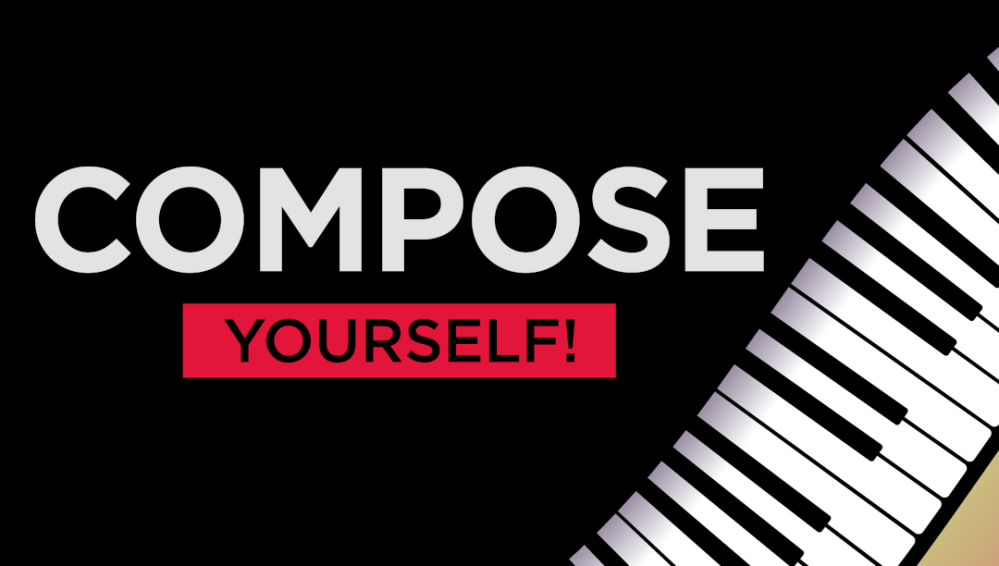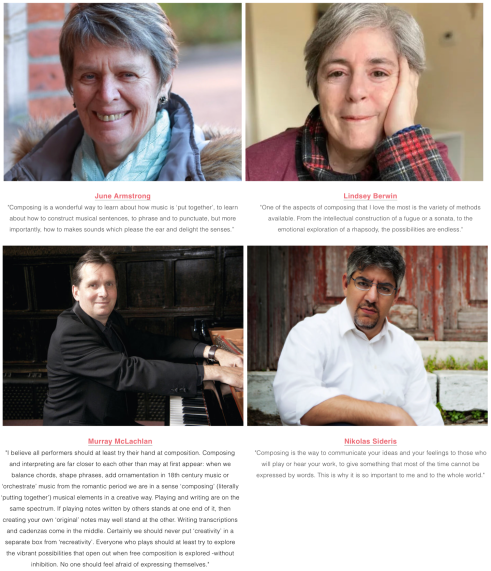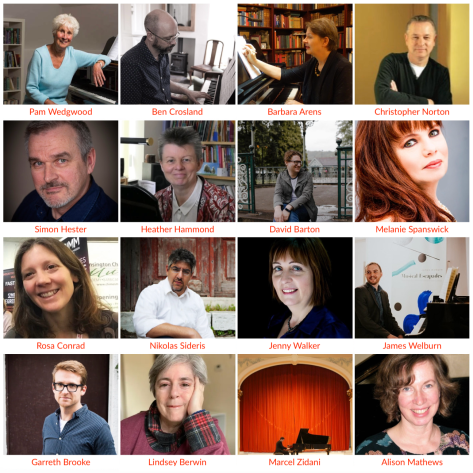Compose Yourself! is an excellent educational project. It’s an annual online competition for children encouraging them to compose their own piano music. I’m delighted to be involved with this project as one of the selected composers, the panel of which consists of an impressive group of renowned educational writers who will be providing their music as part of the prize. These include Pam Wedgwood, Christopher Norton, Barbara Arens, Heather Hammond, and many more.
The competition was founded by composers Alison Mathews and Lindsey Berwin, and in the following guest post, Alison offers more information about this event. Over to Alison…

Compose Yourself! – the annual online piano composition festival is back for a second year, providing an opportunity for creative young pianists aged 5-18 resident in the UK!
Co-founded by myself and Lindsey Berwin, we had the aim of encouraging and supporting young composers as well as inspiring teachers to include composition as a natural part of their student’s learning. We launched in 2021, making it as accessible as possible by taking the event online with both competitive and non-competitive categories. We also decided to offer resources and guidance in the form of free printable activity sheets. This included an animation idea for a soundtrack project, and a growing list of books and articles.
As you may have found in your teaching, some students are natural “noodlers” and love the chance to improvise or compose. However many lack confidence, or believe they can’t compose. Taking that first step into the unknown is often the hardest part! For those students it is best to explore a concept you are working on rather than announce you are going to start composing, which can be rather intimidating. For example, something as simple as legato and staccato – what does it sound like? Could it be footsteps? Your student could have fun creating loud, large footsteps or soft, dainty footsteps! Or perhaps legato is like swimming smoothly through water and staccato, the splashes. There are so many possibilities! These examples may appeal to younger students but you can use this general idea with any age or level. Having a conversation, exploring together and giving praise will help with your student’s confidence.
Here are some further tips:
1. PROVIDE STIMULI
Choose a theme that appeals to your student. One of the most popular themes for my younger students is favourite foods, with ice-cream songs a firm favourite! They may enjoy making up stories, or have a favourite character from a film/book. Using a video to create a soundtrack works well. Alternatively, you could use a particular style and a favourite piece of music your student may have learnt as the basis for their composition.
2. PROVIDE A FRAMEWORK
Exploring a musical form will give an overall structure. Ternary form is a simple form to begin with and it is suitable for many themes – for example a journey or an adventure that begins and ends at home. Storylines or even a musical conversation between different characters can also give a framework.
3. FOCUS ON A TECHNIQUE OR CONCEPT
Rhythm can be an excellent starting point, especially if you are introducing something new. You could explore a particular scale or key. Developing melodic motifs in simple ways or using harmony and exploring chord progressions can be good building blocks. Use staccato and legato or contrasting dynamics to develop articulation and awareness of performance details.
Here is some practical advice:
LISTENING AND REFLECTING
Make sure ideas are written down or recorded quickly in any format, so that your student can return to them later. You will need do this as your student plays so that their flow of ideas isn’t interrupted! Play back what your student has created, so that they can focus, listen, and make choices about the sounds they are making and the direction they are taking. Demonstrate ideas to them too – give choices for them to listen to.
EXPLORE THE INSTRUMENT
A student will feel secure within a certain hand position or key, but do encourage your student to explore all that the piano or keyboard has to offer. Use of different registers provides different atmospheres or moods. Pedal, glissandi, or harmonics can provide interesting effects, or if using a keyboard, different voices and sounds.
BE FLEXIBLE!
You may start off with a printed sheet and a step-by-step plan, but your student may well take a different direction! It is good to have an overall plan in mind, providing boundaries for those free improvisers or plenty of achievable steps for those less confident. Be prepared to adapt and be aware of the pace at which your student works well.

Compose Yourself! Information
The festival is fortunate to have the continued support of Trinity College London and the publisher Editions Musica Ferrum. Our panel of expert judges includes Murray McLachlan, June Armstrong, Lindsey Berwin and Nikolas Sideris (see image above). The festival also has the support of a wonderful group of leading educational composers (see image below) – all entrants receive a piece of music by one of these composers to suit their performance level.

For information on how to register and the entry guidelines please visit www.composeyourself.net Submissions will open from 1st of June and close on 1st July.
Facebook: @PianistsComposeYourself
Twitter: @YourselfCompose
YouTube: Compose Yourself!

My publications:
For much more information about how to practice piano repertoire, take a look at my piano course, Play it again: PIANO (published by Schott Music). Covering a huge array of styles and genres, the course features a large collection of progressive, graded piano repertoire from approximately Grade 1 to advanced diploma level, with copious practice tips for every piece. A convenient and beneficial course for students of any age, with or without a teacher, and it can also be used alongside piano examination syllabuses too.
You can find out more about my other piano publications and compositions here.
from Melanie Spanswick https://melaniespanswick.com/2022/02/20/compose-yourself-by-alison-mathews/
No comments:
Post a Comment